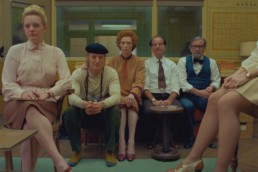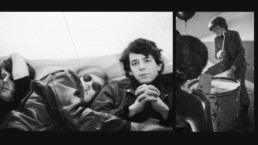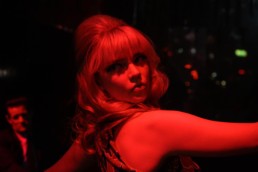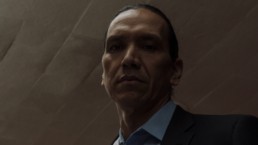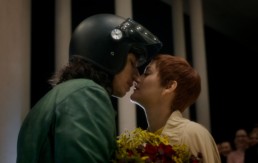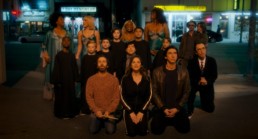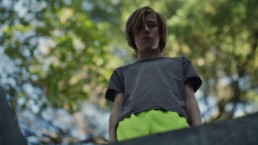With 'The French Dispatch,' Wes Anderson Invents With Short Stories
In a conversation I was having with some cinephile friends earlier this week, one asked the group–ahead of The French Dispatch releasing in theaters today–"Does anyone else feel Wes Anderson-ed out?"
I'll admit, I considered the question at length. I remembered the exuberance I felt while watching the film on the Aero theater's big screen. But the question remained. With his ninth feature, had I finally had my fix of Wes Anderson's fastidiously designed films? Had my storybook sensibilities been utterly exhausted?
Anyone who has seen all–or even just one–Wes Anderson movie knows that every outing from the prolific auteur is pure dessert for moviegoers. A mere moment is among the richest of intricately made confectionary treats. Eating an entire box in a single sitting is either the most savory of experiences, or the most uncomfortably stuffing.
A familiar brilliance
Throughout his entire filmography, Wes Anderson has stayed his course in realizing a vision that recalls the European cinema of the past. With his symmetrical compositions, his vision is unmistakably unique, and utterly his. He's detoured only slightly in his filmography, opting to pit-stop into stop-motion animated films twice (both of which feel just as natural in their meticulously crafted nature as with his real-life films).
The question I pose is, considering the entire body of familiar and brilliant work that The French Dispatch will enter into the company of–like the next ornamentally designed hardcover book slotting into his shelf of others–how and where does it fit in?
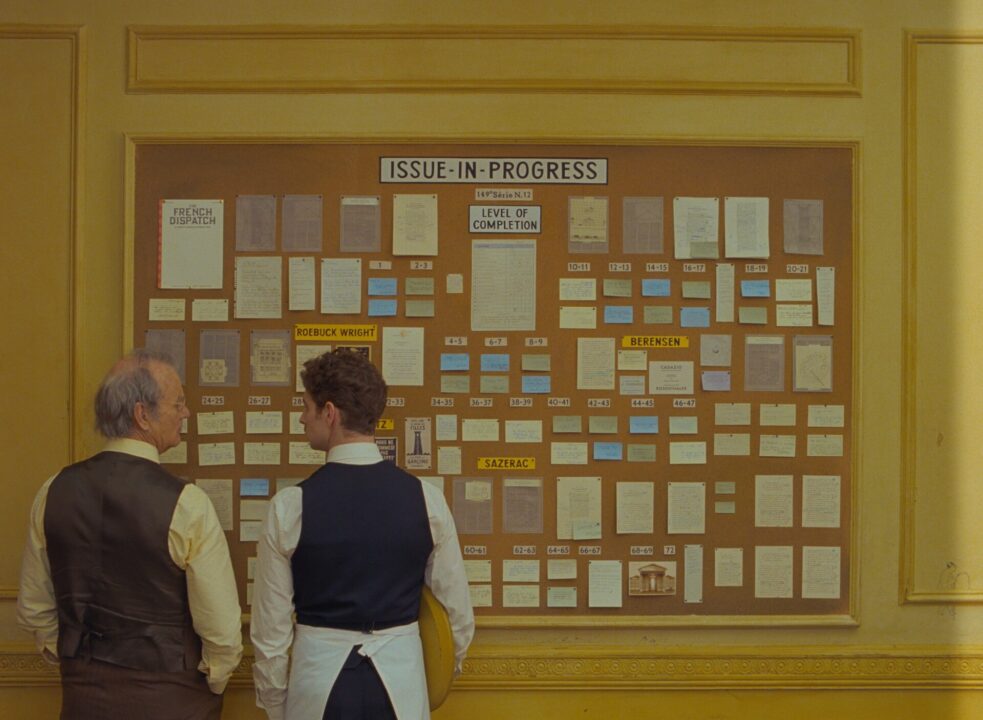
I'm happy and relieved to say that the new film is actually, again, something of another detour in Anderson-land. Where Wes' previous eight films have all adhered to a single plot-driven storyline, the writer/director breaks from that convention only slightly in creatively making The French Dispatch an anthology series of short stories.
That larger backdrop is a fictional magazine (the Liberty Kansas Evening Sun) and its press, which he clearly loves the history of both. It's actually obvious to see how The New Yorker magazine–which he was fascinated with as a child (can't you just picture it?)–inspired his particular and creative writing style that evokes high-society intelligentsia. The French Dispatch is an homage to the institution and people that shaped that early artistic vision.
Anderson, and the anthology
The film's structure breaks from his previous films, in that this outing is a series of short films–articles within an edition that cleverly mirrors a magazine itself. And it's this anthology structure that makes it so welcome and appetizing at this point in his filmography (where was he supposed to go after the enormous accomplishment that was the decades-spanning screwball caper The Grand Budapest Hotel?).
Anderson's recognizable camerawork and cast fit together like clockwork once again: Bill Murray leads the ensemble as the magazine's Editor in Chief, Arthur Howitzer Jr. His personal sayings "No crying" and "Just pretend you meant to write it like that" can't help but call back to Wes' own fixation with composed deliberateness.
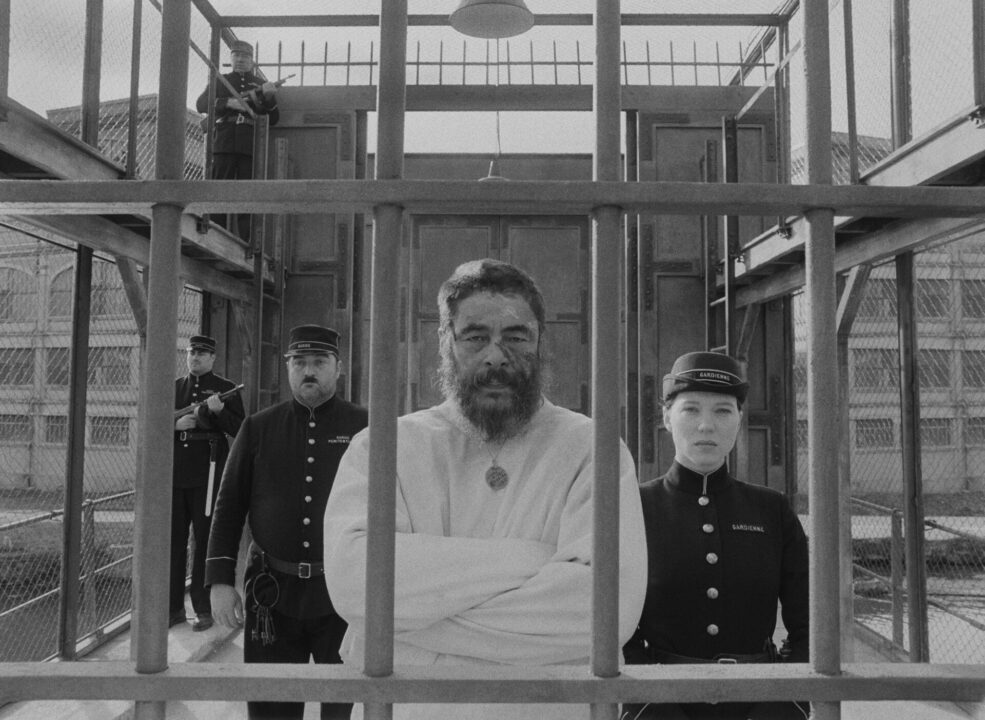
The rest of his regulars pop up again as well, all understanding their assignments. Owen Wilson strolls the city as a "man about town" bicycling reporter. Tilda Swinton earns laughs as an art lecturer. Adrien Brody entertains as a greedy art dealer, and newly-minted Oscar winner Frances McDormand shows she can deliver dry humor better than any.
It's the new faces though that make the biggest splash, and who provide the most exciting time in the film. Benicio Del Toro and Léa Seydoux star in the film's second short story, playing a brilliant but tortured artist/prisoner, and that prisoner's muse/guard. "It" boy Timothée Chalamet stars as a student protestor attempting to lead a revolution in 60s France. And in the film's fourth story (and most emotionally profound), Jeffrey Wright plays a writer and food critic with a larger story to tell.
Welcoming the short story
Following Anderson's last feature film, 2018's stop-motion pup tale Isle of Dogs, The French Dispatch feels like the right welcome back for Wes to display his filmmaking mastery. You can feel how excited he is at giving himself the opportunity to create not just one, but five (and within that, 500) worlds to play in.
However, the nature of the short story is also the film's biggest limitation. For all of its brilliantly-staged choreography that binds everything together, I was left without feeling a deeper significance to invest into, rather than let myself simply be in awe over these madcap comedies. Anderson clearly connects to these stories and characters: of Del Toro's tortured artist, Chalamet's youthful rebel, and Jeffrey Wright's melancholic food critic, in which we see Wes offer profundity and poignancy in a very welcomed way.
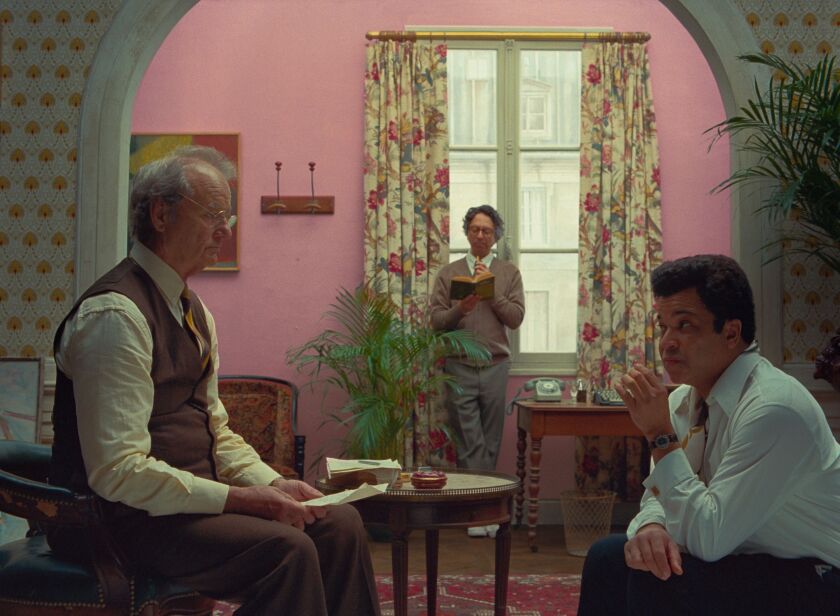
I don't think that The French Dispatch will be included in the shorthand of Wes Anderson's most memorable films. However, it is a different sort of achievement in its own right. A love letter to journalism and the writers and institutions that crafted himself as an artist, you can admire the heart that Wes shows here. And I shouldn't downplay that fact that it really does rival the intricate complexities and huge vision that The Grand Budapest Hotel displayed too. Just try and mentally pause any frame at any moment in your head, and notice the mastery of any one shot.
What was the question again? "Anyone else feel Wes Anderson-ed out?" To that, I say this: empty your head beforehand. Leave your memories, expectations, and projections behind. And then watch it, with eyes anew. I did. And the endless awe and inspiration that I drew from it gave me something worth writing about.
https://www.youtube.com/watch?v=TcPk2p0Zaw4&t=1s&ab_channel=SearchlightPictures
'The French Dispatch' is in theaters Friday, October 22nd.
How 'The Velvet Underground' uses avant-garde filmmaking to tell its story
It's true that The Velvet Underground were a rock band from the 60s. But to say that that's all they were would not be the full picture. To know the legendary rockers–fronted by songwriters Lou Reed and John Cale–is to also know the scene where they were birthed.
This was New York City in the 1960s. Poets, painters, filmmakers and artists of all kinds came from Paris, Berlin and beyond during this time. They brought radical, challenging visions of art to popular culture. It led to a new movement in art and culture called "avant-garde."
This new way of thinking produced work that defied convention and dared to be dangerous–which The Velvet Underground did as well. In the new documentary, The Velvet Underground, director Todd Haynes uses a variety of these same experimental techniques from the avant-garde to tell the story of this band.
A stimulating use of mixed media and visual art
Most conventional documentaries use a standard formula. Digging up images and video of the subject and simply placing over talking heads interviews.
But Todd Haynes isn't here to make a traditional documentary. In his first documentary feature, Haynes–an art major in college himself–shows his art school chops by using a variety of mixed media to tell the story of The Velvets.
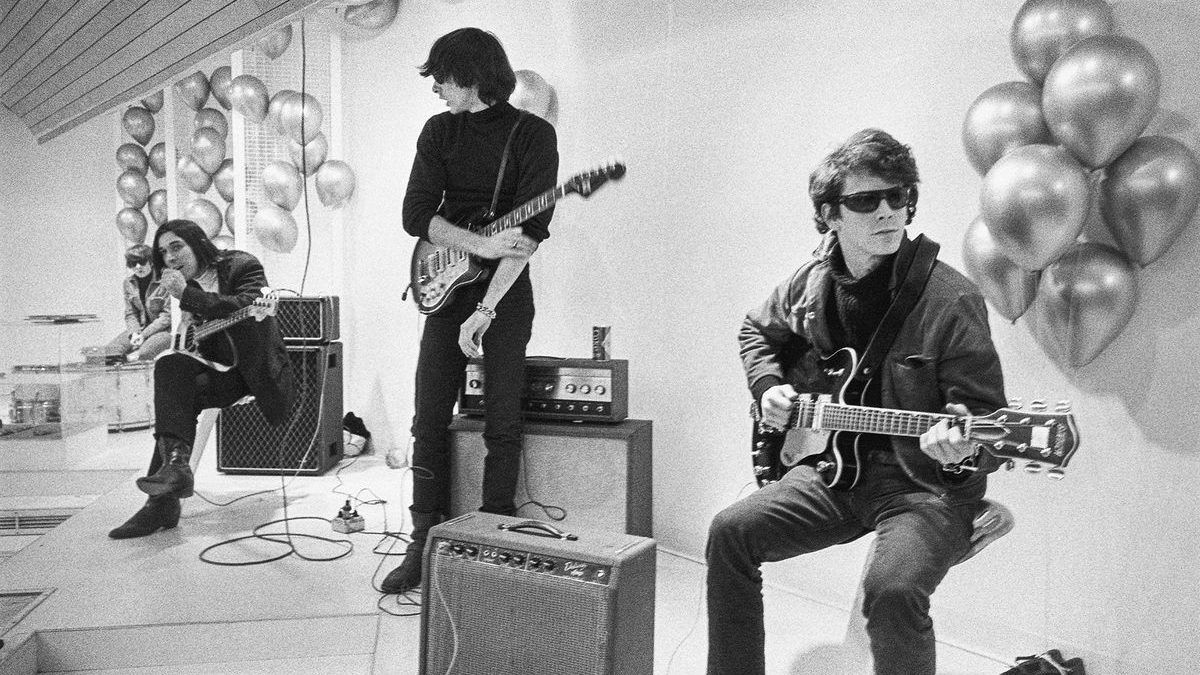
Montages of fragmented clips that loop in dizzying array produce a whirlwind effect. Haynes does use talking head interviews to tell the story (only of those who were there). But he uses a split-screen format to combine interviewees with artfully edited mixed media, making for a unique viewing experience.
And who else would these experimentations harken back to, but the pop art master himself: Andy Warhol. The documentary shows to a great degree how influential and important Warhol was to the band's success. We learn of his meeting Lou Reed and discovering the band, them all hanging out at "The Factory," and producing their debut album and touring their "Exploding Plastic Inevitable" live show (all with the radiant singer Nico).
Screeching, hypnotizing, droning and distortion
One of the challenges that rock docs face is needing to make the music shine in such a way that shows how powerful it was. Todd Haynes uses a variety of sonic techniques to evoke the band's presence.
Of course we get the hits like "Waiting For My Man" and "Venus in Fur." But Haynes also features a sound that the Velvet Underground became so famous for: a single droning, harmonic note.
John Cale–a trained classical musician–discovered how using a viola to sustain a single note over long periods of time could produce a hypnotic effect. Lou Reed's guitar and vocals combined to make for a sound that blew people away.
There are also numerous moments where amplified feedback is the center of attention. I saw the film in theaters, and when heavy distortion showed a lot of people needing to cover their ears.
It's challenging in form–like the band
I don't think that people of all kinds are going to take to this documentary. For, as far as documentaries go, it's a fairly challenging watch. And that's why it's perfect in form for its subject.
The Velvet Underground challenged all the conventions of their time. Lou Reed had a troubled childhood, in which he said that shock therapy was used on him to get rid of his homosexual attractions. His demons would grow, using heroin regularly. But his artistry grew too, being inspired by the Beat poets and the Beatles alike.
Todd Haynes highlights themes like repressed homosexual eroticism that he has used in previous films like Carol. Drug use isn't glorified, but it's not shied away from either.
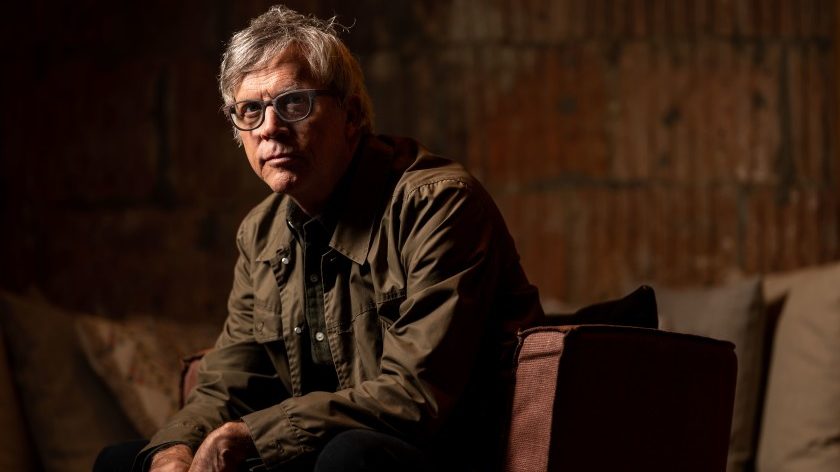
Along with distortion and intentionally abrasive amplifier feedback, Haynes also uses some strobing light effects to evoke a different sort of consciousness.
All of these choices make the documentary something that you might think could play in a gallery or museum. It challenges you to stay with it. And I don't believe that everyone will.
And that is what makes avant-garde artistry: challenging the norm, to push people out of their comfort zones, to be enlightened in a way that they otherwise wouldn't have. The Velvet Underground knew this, and Todd Haynes clearly does, as well.
https://youtu.be/hWq7a8Tin8g
'The Velvet Underground' is in theaters and on Apple TV+ on Friday, 10/15.
What To Watch in October: 10 Incredible New Films You Have to See
Nearly all of this year's originally-planned film releases have been affected by the ongoing shake-up to the movie-going experience, whether it's because their theatrical release dates have been pushed back or were switched to day-and-date releases on streamers. However, we've finally arrived in October. And since it's my most anticipated month for seeing new movies this year, I compiled a list of what to watch in October that I'll be seeing, and that you hopefully will too.
There are so many films coming out this month, which were also made to be seen on the big screen. Which film are you absolutely heading to the theaters to see?
Titane
https://www.youtube.com/watch?v=T975nUk_uNA&ab_channel=NEON
What it’s about: Following a series of unexplained crimes, a father is reunited with the son who has been missing for 10 years. Titane: A metal highly resistant to heat and corrosion, with high tensile strength alloys.
Why we’re looking forward to it: Winner of the Palme d'Or at this year's Cannes Film Festival, Titane is without a doubt the wildest, most insane film you'll see all year. Be sure to see this one on the big screen.
Related: ‘Titane’ Review: The Most Horrifically Insane Film You Will See All Year
‘Titane’ is in theaters Friday, October 1.
Lamb
https://www.youtube.com/watch?v=hnEwJKVWjFM&ab_channel=A24
What it’s about: A childless couple, María and Ingvar discover a mysterious newborn on their farm in Iceland. The unexpected prospect of family life brings them much joy, before ultimately destroying them.
Why we’re looking forward to it: Every new A24 release is an exciting movie-going event. However, a new horror film from the studio behind such mind-bending films as Midsommar and The Lighthouse makes us even more excited. If that doesn't sell you on checking out Lamb, the devilishly delirious trailer surely will.
‘Lamb' is in theaters Friday, October 8.
Mass
https://www.youtube.com/watch?v=oU56Ns1nXsE&ab_channel=BleeckerStreet
What it’s about: Aftermath of a violent tragedy that affects the lives of two couples in different ways.
Why we’re looking forward to it: We're calling it now: the most riveting, finest acted film from an ensemble cast this year.
‘Mass' is in theaters Friday, October 8.
The Rescue
https://www.youtube.com/watch?v=_-Kw5kAPSbk&ab_channel=NationalGeographic
What it’s about: Follows the story of the Wild Boars youth soccer team who got trapped and their dramatic 2018 rescue.
Why we’re looking forward to it: The next high-adrenaline, live-action documentary from directors Jimmy Chin and Elizabeth Chai Vasarhelyi looks just as intense and heart-pounding as their last Oscar-winning film, Free Solo.
'The Rescue' is in theaters Friday, October 8.
Possession (4K Restoration)
https://www.youtube.com/watch?v=Ah4Z1yIAoFM&ab_channel=Metrograph
What it’s about: A woman starts exhibiting increasingly disturbing behavior after asking her husband for a divorce. Suspicions of infidelity soon give way to something much more sinister.
Why we’re looking forward to it: Confession time: I haven't seen Andrzej Żuławski’s 1981 film Possession. The fact that I'll finally be able to see the classic as part of its 4K restoration brings me such joy (and only a little dread).
‘Possession’ is in theaters theatrically and digitally exclusively at Metrograph Friday, October 1. In theaters nationwide Friday, October 15.
The French Dispatch
https://www.youtube.com/watch?v=TcPk2p0Zaw4&ab_channel=SearchlightPictures
What it’s about: A love letter to journalists set in an outpost of an American newspaper in a fictional twentieth century French city that brings to life a collection of stories published in "The French Dispatch Magazine."
Why we’re looking forward to it: Wes Anderson's latest feature film. Enough said.
‘The French Dispatch’ is in theaters Friday, October 22.
Dune
https://www.youtube.com/watch?v=8g18jFHCLXk&ab_channel=WarnerBros.Pictures
What it’s about: Feature adaptation of Frank Herbert's science fiction novel, about the son of a noble family entrusted with the protection of the most valuable asset and most vital element in the galaxy.
Why we’re looking forward to it: Are we more excited to see the visionary director Denis Villeneuve's epic big screen piece, or Timothée Chalamet and Zendaya (and an incredible ensemble cast) share the screen? It's... a draw.
‘Dune’ is in theaters and (unfortunately) on HBO Max on Friday, October 22.
Last Night in Soho
https://www.youtube.com/watch?v=AcVnFrxjPjI&ab_channel=FocusFeatures
What it’s about: An aspiring fashion designer is mysteriously able to enter the 1960s where she encounters a dazzling wannabe singer. But the glamour is not all it appears to be and the dreams of the past start to crack and splinter into something darker.
Why we’re looking forward to it: I would've already been all-in if Edgar Wright's new film was simply a stylish throwback to London's Mod scene (in the same way Tarantino wrote his 60s love letter to Los Angeles with Once Upon a Time... in Hollywood). But Last Night in Soho also promises some sort of time and mind-bending horror ghost story to boot. Oh, and Anya Taylor-Joy.
‘Last Night in Soho’ is in theaters Friday, October 29.
Antlers
https://www.youtube.com/watch?v=2aiYxwVuZ1o&ab_channel=SearchlightPictures
What it’s about: In an isolated Oregon town, a middle-school teacher and her sheriff brother become embroiled with her enigmatic student, whose dark secrets lead to terrifying encounters with a legendary ancestral creature who came before them.
Why we’re looking forward to it: Antlers was unfortunately one of the films to have its original release date pushed, so it's been on our radars for quite a while now. We couldn't be more stoked to see it get a Halloween-timed release.
‘Antlers’ is in theaters Friday, October 29.
The Souvenir Part II
https://www.youtube.com/watch?v=3PR_ZK57c54&ab_channel=A24
What it’s about: A young film student in the early 80s becomes romantically involved with a complicated and untrustworthy man.
Why we’re looking forward to it: When we first saw The Souvenir, we were absolutely floored. Further, we couldn't believe our eyes when we saw in the credits that Part II was planned to release. Well, Joanna Hogg's follow-up film, starring Honor Swinton Byrne (Tilda Swinton's daughter) is coming out to complete the devastating story.
‘The Souvenir Part II’ is in theaters Friday, October 29.
Did you discover a new film? Did we miss one? Let us know in the comments below what you'll be seeing this month.
'Wild Indian'–A Thriller About Generational Trauma–Gets Dark
Our 'Wild Indian' review was first published after the film's premiere at the 2021 Sundance Film Festival.
In his feature debut, Wild Indian, Indigenous filmmaker Lyle Mitchell Corbine Jr. commands the big screen with the story of a Native American man, whose trauma-filled past leads to him committing an act of violence that changes multiple lives forever.
What makes the film so powerful is that, beyond it operating as a highly taut thriller, Wild Indian connects it's present day pain to the larger pain-filled past that Native American people have carried for centuries, making for both an expansive and intimate watch.
A history of Indigenous people's suffering.
From its start, Wild Indian captures the suffering of Native people, by presenting a title card that reads how man's sickness was carried west (the connotation of the "western world" being an important note here), as well as the visual of an early Native man in headdress and tribal wear standing over another downed by an arrow, showing a vast history of pain that writer/director Lyle Mitchell Corbine Jr. connects back to later.
A jump in time brings us to the image of young Makwa (Phoenix Wilson), whose largely silent demeanor hiding behind shaggy hair that often hides the signs of abuse at his father's hand. Although Makawa is comforted daily by his sensitive friend Ted-O (Julian Gopel), his agitation turns into a quiet anger, which, on one fateful day, results in the senseless killing of a classmate, leaving Makwa and Ted-O with a horrific secret to keep.

A confident vision from an Indigenous director.
Corbine Jr. makes the confident directorial decision to then leap forward in time over thirty years to 2019, where we see Makwa (Michael Greyeyes)–who now goes by "Michal Peterson"–has succeeded in making a great life for himself, with a white-collar career and partner (Jesse Eisenberg), and wife (Kate Bosworth). Makwa's fortune impresses the audience, but the real surprise is when we see a grown-up Ted-O (Chaske Spencer), his previously meek, sensitive friend, now covered in face tattoos and being released from prison.
It's here that Wild Indian puts forward its morality-seeking themes of past sins, and how we are affected by them, as the centerpiece of the film. Considering Makwa's direct act of committing murder, it's powerful that the film flips expectations in this way. But Makwa's repression of his dark past continues to come out in compulsively sick ways, while Ted-O is distraught with the guilt he has carried, forcing the two former friends to each reckon with their past.
Deeply powerful performances.
Wild Indian is cemented by deeply powerful performances by its two leads. Chaske Spencer takes on a scary exterior with face tattoos and a shaved head, but it's a quiet suffering that makes his character so believable. Greyeyes, with his icy and stone-faced exterior, is able to take on the range of chilling detachment through his eventual crumbling vulnerability. All of this is captured through strong camerawork of gliding sequences and close-up shots to capture the emotions of spirituality and timeless connection, which makes the film feel larger than the frame onscreen.
When all things come to a head for Michael, forcing him to return to his past and leave his new California coast life, the film connects back to its original message of circular patterns of trauma. Wild Indian is a gripping and emotionally charged film that proves powerful both for its thrilling elements as well as its representation of Native culture on the big screen, in substantial roles that we deserve and hope to see more of.
'Cryptozoo' Review: These Hand-Drawn Fantasy Creatures Delight
Our ‘Cryptozoo’ review was first published after the film’s premiere at the 2021 Sundance Film Festival.
Treat yourself to a deep toke of your preferred strain of cannabis, and settle in for writer/director Dash Shaw's animated film Cryptozoo, a counter-culture-minded fantasy-adventure about the existence of imaginary creatures. It also speaks on humans' varying efforts of safeguarding and domesticating endangered species and understanding the "other" in the hopes of conceiving a utopian world.
With its child-like, trippy visuals, it's easy to feel like you're catching a contact high from just watching the film. It's simply rendered; the flat, 2-D hand-drawn animation of pencil lines and blotty ink, along with its stop-motion fluidity, feels as if the doodles from the corner of a stoned high schooler's notebook came to life in vivid wonder.
Cryptozoo doesn't so much require an active effort to follow along with, story-wise, and instead opts to slow you down. Its glacially-moving pace feels like a nice drift into a lazy, spellbinding daydream.
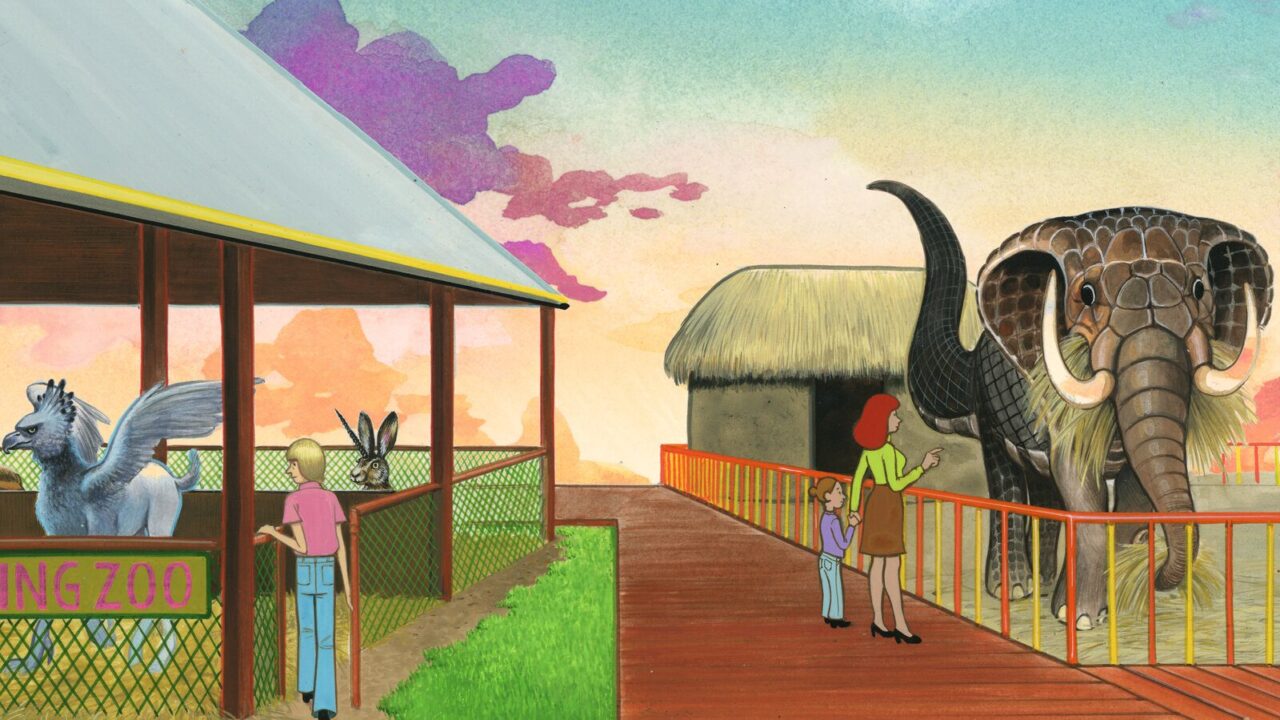
You'll first need to know what "cryptids" are, which the film explains as animals whose existence is unknown or doubted (which, if you're unaware, are rooted in cultural folklore and mythology). Lauren Gray (Lake Bell) is an activist who frees cryptids from black market opportunists. When the US government sets its sights on capturing the Baku–a cryptid that can suck out dreams–for weaponizing its powers to "wipe out the dreams of the counter culture," Lauren teams up with Medusa-humanoid Phoebe (Angeliki Papoulia) to save the creature and their world (because "without dreams, there is no future").
Cartoonish and yet beautifully textured, Dash Shaw (My Entire High School Sinking Into the Sea) and Jane Samborski (Cryptozoo's animation director) pair wonderfully in bringing a balanced mix of limitless imagination. They also give millennial-minded reverence for counter-culture graphic art of the 60s, which extends to the idealism of the time that is at the heart of this film as well. They're both earnestly-minded artists with pure-hearted love for these imaginary creatures, and it's obvious that this film shouldn't be written off as just a "trippy movie."
Shaw explores our flawed human logic of the "Cryptozoo," which Lauren calls a "sanctuary to preserve the animals" – but it's as much that as it is a Seaworld-esque amusement park. The themes of domestication, preservation, exploitation, and control pop up as well. And it's all staged against the evil, controlling US government, whose demonization is both infantile as it is accurate (swap out "cryptids" with indigenous people and it's a story about our history of dominating other cultures).
Highly inventive and imaginative, Cryptozoo is a playful fantasy adventure with altruistic ideas of man's relationship with the natural world and animal liberation. Dash Shaw proves that a child's eye and mind is the best way to see magic and understand oppression and letting things be free. Take a trip to Cryptozoo and into a world that imagines how a more ideal way of life can be lived.
'Annette' is the Most Absurdly Odd Rock Opera You'll See All Year
It's best to know before watching Annette that it was not originally intended to be a film. Rather, it was conceived to be performed as a live musical production. With an original story and music written by art pop band Sparks, Annette defies some conventions, and sticks to others.
How Sparks Wrote Annette.
Ron and Russell Mael have made brilliantly catchy music over the entirety of their very long career. However, it's not been without also defiantly distancing themselves from commercial compromise. This has been to the point that true mainstream success has eluded them. In fact, Edgar Wright made the rock doc The Sparks Brothers earlier this year as an ode to their unsung greatness.
Always interested in charting new waters rather than playing into expectations explains why Annette came into existence as a musical at all (initially, Russell would play the lead role and Ron the supporting male role). That is, until the duo met director Leos Carax when he used one of their songs for his film Holy Motors. And what happened next is–eight years later–Carax would take their story and bring it to the big screen.
https://www.youtube.com/watch?v=l_EaNpL16SU&ab_channel=AmazonPrimeVideo
So... what's Annette about?
With all of this in mind, it should be no surprise to find that Annette is exactly what you would expect a rock opera from Sparks to feel like. It's a wonderfully strange and self-aware circus that's as infectiously catchy as it is bizarrely confounding. But for as much fun as it is, its pop music makeup is also the thing that makes it unable to be profound or deep in any real way. But I'd recommend managing those expectations and going into this film headstrong anyways. It's still one of the most mind-blowing films of the year.
Beyond its memorably wacky songs and story, the unquestionable stand-out in the film is Adam Driver. As tormented comedian Henry McHenry, Driver makes the character his own. Wild slapstick comedic scenes range to the more nuanced and commanding ones. Marion Cotillard and Simon Helberg also star in the film. Cotillard matches Driver's commitment and star power as the opera singer Ann. But one of the faults of the film is that it underwrites the rest of the characters in the service of Driver. And yet, its perhaps because he was attached to the film since Leos Carax saw him in Girls eight years ago.
A satiric, confounding experience.
And then of course, we need to mention the nature of baby Annette herself. Her hilariously marionette-like characterization as an actual wooden puppet is the film's silliest and un-serious depiction. This further pokes fun at the charade of the whole thing. And yet, there's still a soft and gentle beauty in Annette's presence. This counters Henry's forgone depravity, but fails to reach a real emotional impact.
There are themes of art and love and life and death interwoven throughout Annette but you'll have a much more enjoyable time if, instead of looking for an experience that will leave you emotionally floored, you give yourself over to a strange world that is sure to leave you in awe, for better or worse.
5 Things to Know Before You See 'Annette'
The new film Annette is without a doubt, one of the year's strangest and simultaneously transfixing films that you can see this year. This slightly more-than demented rock opera–starring Adam Driver and Marion Cotillard–shows the perils of fame with such bewildering vision that you might want to know a few things about it before going in. Here's a few things to know before seeing the film (now playing in select theaters and available to stream on Amazon Prime this Friday).
Related: ‘Annette’ Review: The Most Absurdly Odd Rock Opera You’ll See All Year
Annette was not originally conceived as a film.
The band Sparks, who wrote the story and music, originally conceived it to be performed live (with Russell Mael performing Adam Drivers' role and Ron Mael playing Simon Helberg's part). The piece was being readied to release and tour when the Maels met director Leos Carax at Cannes Film Festival (after he put a Sparks song on the soundtrack of his film Holy Motors) and decided to turn the idea into a film.
The main influence was The Umbrellas of Cherbourg.
Sparks has shared that they were inspired to write a musical in the same way that Jacques Demy's musical is "sung-through" in a sort of spoken/sung manner. Sparks has specifically noted that the opening scene in The Umbrellas of Cherbourg, at the mechanic shop, perfectly sets the tone for the style of the film to follow.
Annette took over 8 years to make.
Annette was in development for so long that at different points, both Rooney Mara and Michelle Williams were attached to play the lead female role (which eventually went to Marion Cotillard). Adam Driver was attached to star from the beginning (when Leos Carax first saw the actor in HBO's Girls) and remained with the film over the entirety of development.
Adam Driver and Marion Cotillard sang live on set (including during simulated oral sex).
Cotillard revealed how Leos Carax requested that she and Driver sing live, and what challenges that brought: "It added to the complexity of the set: we found ourselves singing in very complicated positions, doing back-crawling or mimicking cunnilingus; acrobatic positions that technically modify your song [the way you sing]."
Simon Helberg became a French citizen to get the role.
Simon Helberg was so eager to get the part that he became a French citizen and learned French, as the production needed more EU citizens in the cast to get EU funding. It turned out to be unnecessary as Marion Cotillard was cast in the role previously given to Rooney Mara and Michelle Williams.
'Annette' is now playing in select theaters and available to stream on Amazon Prime this Friday.
https://www.youtube.com/watch?v=l_EaNpL16SU&ab_channel=AmazonPrimeVideo
'John and the Hole' Review: Trapping Your Childhood
It would be understandable to ask, much as I did while being led down the absurd path that John and the Hole leads its audience, where is the bottom of this movie? To what depths will this playfully sadistic film go?
In broad terms, John and the Hole is a film about a child who rebels against his family. The more specific, spoiler-filled description is that it's a film about a young boy who–for reasons that are at first unknown–drugs and drops his father, mother, and sister into a bunker on the family's property, leaving them trapped while he is left to preside above.
It's an absurd premise that rests upon a dark inclination, and it would be understandable to assume that the film would take an utterly depraved descent into the horrific from there. But audiences should feel comfortable in knowing that in director Pascual Sisto's world, trapping one's family is just a necessary formality so that a child can explore what it means to be an adult, and beyond that, freedom.
John and the Hole is a black comedy that feels like if Yorgos Lanthimos directed a version of Home Alone, or if Lynne Ramsay's wicked We Need To Talk About Kevin wanted to let a little air out of itself. Sisto's filmmaking–cold and clinical, yet clean and pristine (and opts to shoot 4:3 aspect ratio, whose black letterboxing traps the whole story in a proverbial hole)–feels more like an exercise to capture tone and mood, but its pitch-black tone cradles its odd fable, which explores the nature of childhood and the resigned feeling of being helpless and dependent on adults, and needing them and not understanding why.

These are the thoughts that occupy our titular character, John (Charlie Shotwell, Captain Fantastic), an intellectually gifted yet odd kid. He's proficient at tennis and piano and knows the square root of 225 (even though he "doesn't know" how he knows). But he's trapped in his head, unable to communicate a confusion that comes from not understanding the outside, grown-up world. His family extends their love and non-threatening warmness to his sweet, silent self. That's why it's a total left-turn when his family wakes up one morning to find themselves trapped at the bottom of a bunker with no way out.
Sisto plays with denying the audience the reason why John's trapped his family at the bottom of a hole, but we soon find that it's more innocent than it is sadistic; he's not getting pleasure in torturing them. He checks in on his family (Michael C. Hall, Jennifer Ehle, and Taissa Farmiga) occasionally, it's just that he wants to do fun kid things, like play with his drone, eat fast food, and play video games with his friend (who he picks up joyriding the family car).
With such a wild concept, John and the Hole could so easily fall apart into the ridiculous at any moment. But Sisto provides an airtight framework that feels in control of its absurd logic and vision every step of the way while remaining playful and sidestepping expectations to be a mostly innocent exploration. And, without giving anything further away, there's a narrative framing device that's revealed past the film's initial introduction that establishes another layer to the film and shows that maybe he's trapping his family out of misplaced fear so that they can never leave him.
Selected to play at Cannes Film Festival, John and the Hole is a confident, visionary, and daring exercise in tonal filmmaking, as well as a provocative exploration of childhood and adulthood. Sisto leaves much of the film open to interpretation, so the audience can make a lot of its own meaning. In that sense, there's much to consider while going farther and farther down into the void.
This review originally ran as part of our 2021 Sundance Film Festival coverage.

